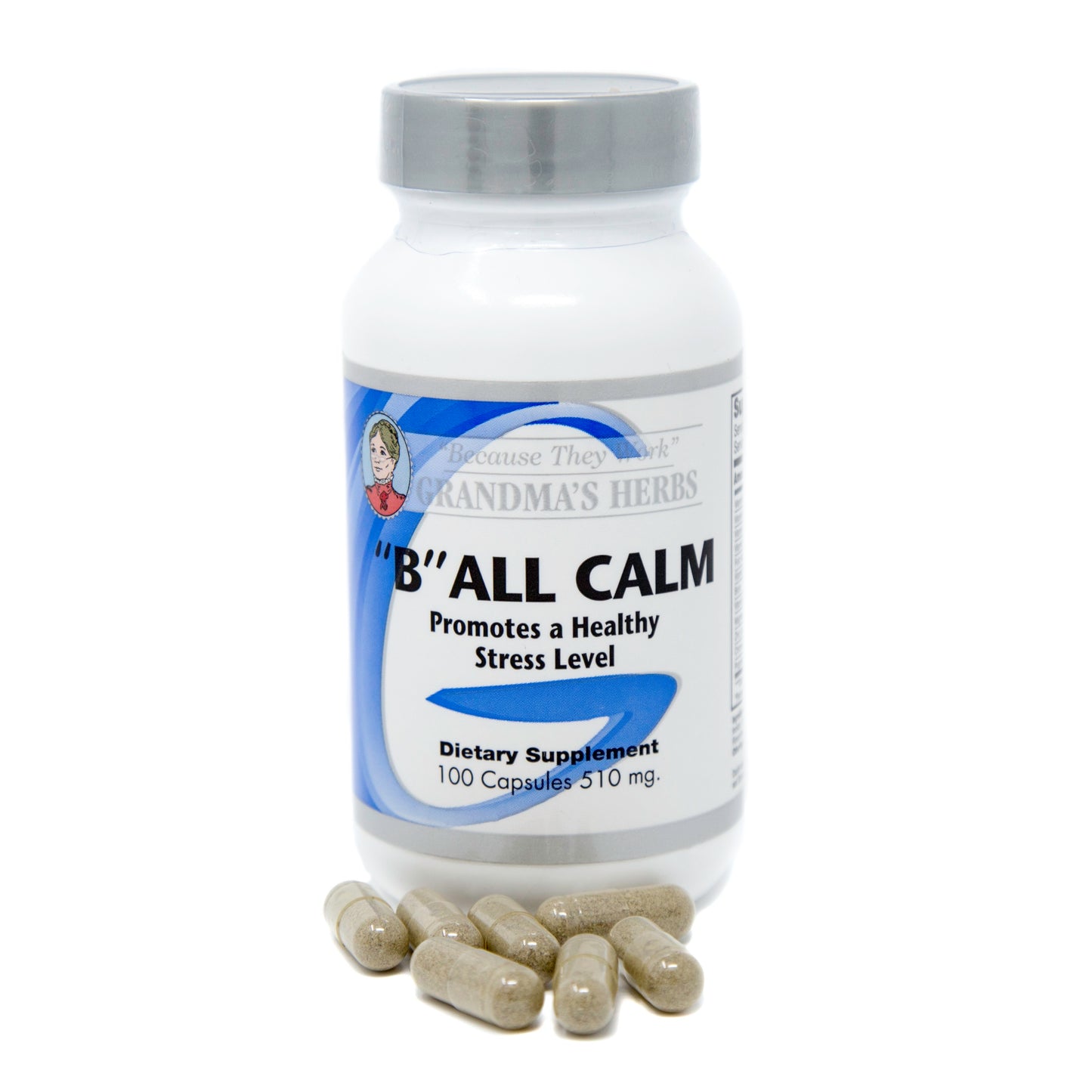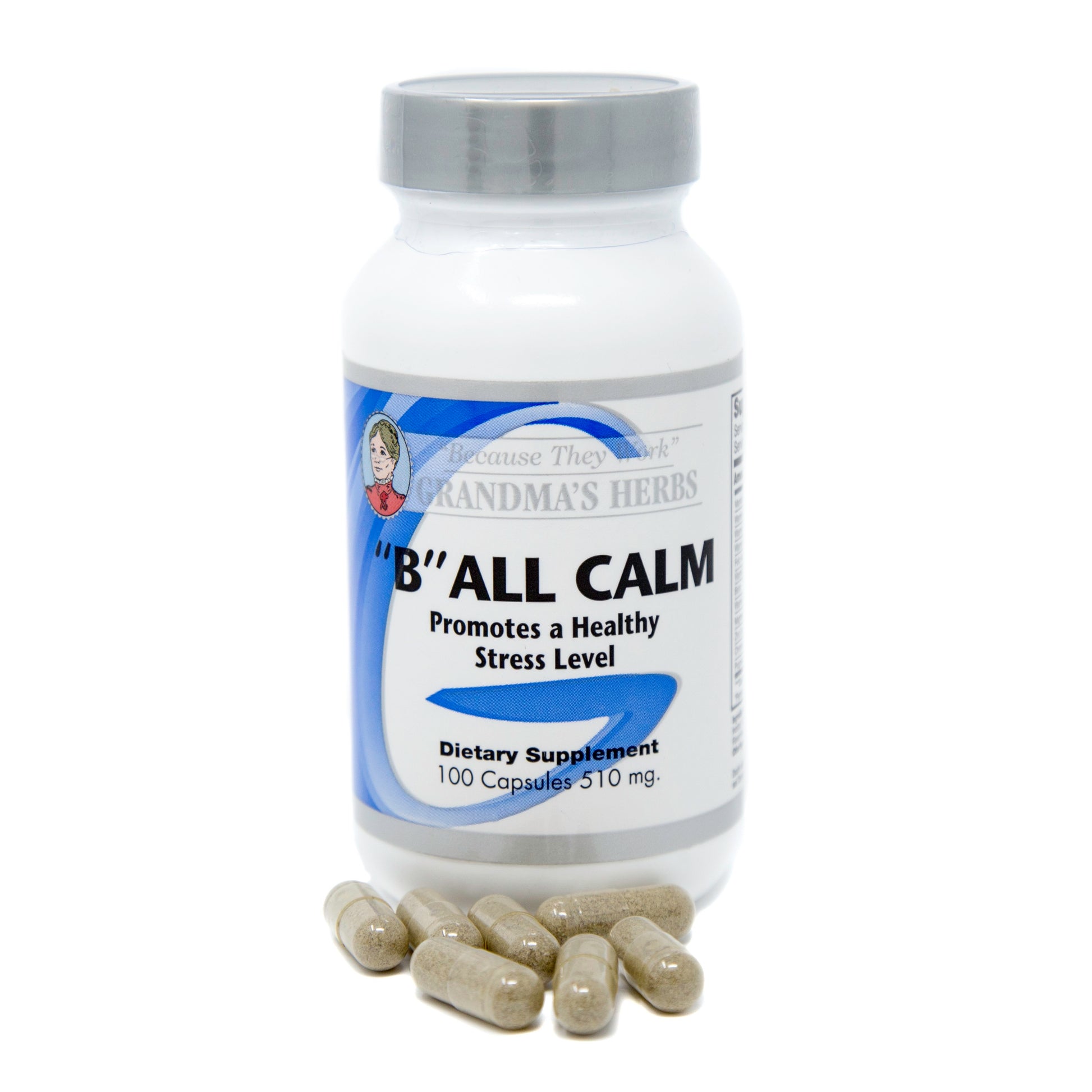Grandma's Herbs
B All Calm
B All Calm
Couldn't load pickup availability
Research:
Herbs and Supplements:
St. John's Wort
- St. John's Wort is native to Europe, particularly well-known in areas surrounding Great Britain, and now grows wild in many parts of the world.
- It is commonly found in meadows and along riverbanks, preferring sunny spots with chalky soil. The herb is believed to be named after St. John the Baptist, as it blooms around his feast day on June 24th.
- St. John's Wort contains various natural compounds, including hypericin, along with other elements like hyperforin and flavonoids.
- Researchers suspect that ingredients in the herb (hypericin and hyperforin) may promote a balance with certain hormones.
- St. John's Wort has a long history of use across different cultures for various traditional practices.
- This herb continues to be recognized today for its historical and traditional uses.
- St. John's Wort is a plant that has been traditionally used in herbal practices for various purposes, including supporting mood balance.
Valerian Root:
- Valerian is a flowering plant native to Europe and Asia, known as Tagar in Ayurvedic traditions and Xie Cao in Chinese practices.
- The root of the valerian plant has been used for centuries, with references dating back to the Greek and Roman Empires and mentions in the writings of Hippocrates.
- Valerian root contains various natural components, including valerianic acid and a group of compounds known as iridoids, such as valepotriates. These elements may increase the activity of a neurotransmitter called GABA (gamma-aminobutyric acid) in the brain.
- Valerian root continues to be recognized across cultures for its long-standing role in various herbal practices.
B Vitamins Overview:
B vitamins are essential nutrients that play a key role in various bodily processes. At Grandma's Herbs, we refer to them as the "happy vitamins." Vitamin B complex includes eight distinct vitamins:
- B-1 (thiamine)
- B-2 (riboflavin)
- B-3 (niacin)
- B-5 (pantothenic acid)
- B-6 (pyridoxine)
- B-7 (biotin)
- B-9 (folic acid)
- B-12 (cobalamin)
These vitamins assist enzymes in performing various cellular functions, such as breaking down carbohydrates and helping transport nutrients throughout the body. B vitamins also contribute to important processes, such as energy production from food and the formation of red blood cells.
B vitamins are involved in maintaining healthy skin cells, brain function, and other tissues. While each vitamin serves a unique role, they often work together to support the body's systems.
Magnesium:
Magnesium is an essential mineral involved in over 300 enzymatic reactions in the body. These include functions such as food metabolism, fatty acid and protein synthesis, and nerve impulse transmission.
GABA (Gamma-Aminobutyric Acid):
GABA is a neurotransmitter that facilitates communication between the brain and the nervous system. It is synthesized in the brain from glutamate through a process that requires the active form of vitamin B6 and the enzyme glutamate decarboxylase. Current research is focused on understanding GABA's role in managing the body's response to stress.
5-Hydroxytryptophan (5-HTP):
5-HTP is an amino acid involved in the production of serotonin, a neurotransmitter in the brain. Serotonin plays a role with mood, emotions, and social behavior.
The information provided above is for educational purposes only and does not pertain to the performance or intended use of any specific products featured on this website.
*These statements have not been evaluated by the Food and Drug Administration. This product is not intended to diagnose, treat, cure, or prevent any disease.
Help Me Choose:
"B" ALL CALM
This new formulation of "B" ALL CALM has been developed to support a sense of calm during challenging moments. It combines a blend of carefully selected herbs along with a spectrum of B-vitamins, magnesium, and GABA.
The information provided above is for educational purposes only and does not pertain to the performance or intended use of any specific products featured on this website.
*These statements have not been evaluated by the Food and Drug Administration. This product is not intended to diagnose, treat, cure, or prevent any disease.
Health Information:
Lifestyle Coaching - Healthy Emotional Outlets
Exercise:
- Engaging in physical activity is a helpful way to let off some steam. Regular exercise is associated with improved mood and greater resilience to life’s challenges. Physical activity encourages the release of endorphins, which are natural chemicals known to promote a sense of well-being.
- Exercise can also influence stress-related hormones, such as cortisol, and support emotional balance over time. Incorporating regular physical activity into your routine, whether it’s walking, running, yoga, or other forms of exercise, can be an effective way to maintain mental and physical well-being.
Reduce Caffeine Intake:
- Caffeine is a stimulant commonly found in coffee, tea, chocolate, and energy drinks. People have varying levels of tolerance to caffeine, and high amounts can sometimes increase feelings of restlessness.
Laugh:
- Laughter can promote a sense of relaxation and lift your spirits. Engaging in activities that make you laugh, can help foster emotional well-being and provide a momentary break from everyday challenges.
Meditate with Soothing Music:
- Meditation has been practiced for centuries as a way to cultivate a calm state of mind. Pairing meditation with instrumental music that you find personally relaxing can enhance the experience.
Yoga:
- YES those odd poses that seem to contort bodies in ways that they just shouldn't bend are good for you physically and emotionally!
- Yoga has become a popular activity across different age groups, combining physical movement with mindful awareness. Many yoga practices focus on increasing body and breath awareness, promoting relaxation, and supporting a balanced state of mind. Engaging in yoga regularly may contribute to overall well-being and encourage emotional resilience.
- The benefits of yoga may be linked to its calming effect on the body's stress response. Practicing yoga can help promote relaxation and balance by encouraging mindful breathing and gentle movement. Many individuals incorporate yoga into their daily routines to support both physical and emotional balance.
The information provided above is for educational purposes only and does not pertain to the performance or intended use of any specific products featured on this website.
*These statements have not been evaluated by the Food and Drug Administration. This product is not intended to diagnose, treat, cure, or prevent any disease.
Ingredients:
Vitamin B1 (as Thiamin), Vitamin B2 (as Riboflavin), Vitamin B3 (as Niacinamide), Vitamin B6 (as Pyridoxine HCL), Folic Acid, Vitamin B12 (as Cobalamin 1%), Biotin (1%), Vitamin B5 (as Pantothenic Acid), Magnesium (as A.A. Chelate), Zinc (as Acetate), Chromium (as Polyniconate 10%)
Herbs: St. John's Wort (whole), Ginkgo Biloba (leaf), GABA Inositol (USP), Choline (as Bitartrate), Valerian (root), Passion Flower (herb), Griffonia Extract 25% (5-HTP)
Instructions:
2 Capsules each morning with food. Take an additional 2 to 3 times per day as needed.
What’s Included:
1 bottle of Grandma's Herbs "B" ALL CALM*
100 Capsules.
Features:
Promotes feelings of well-being.
The information provided above is for educational purposes only and does not pertain to the performance or intended use of any specific products featured on this website.
*These statements have not been evaluated by the Food and Drug Administration. This product is not intended to diagnose, treat, cure, or prevent any disease.
Share




